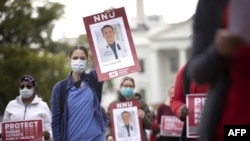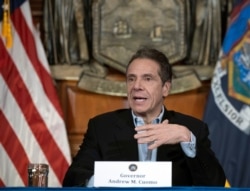Governments around the world are taking steps to reopen countries as economies decline, unemployment grows and people get restless.
The World Health Organization warned Tuesday that relaxing lockdowns too quickly could lead to a resurgence of the coronavirus. Health authorities in many countries agree.
Robert Redfield, director of the U.S. Centers for Disease Control and Prevention, said Tuesday the second wave of infections this winter could be more deadly than the first. The number of COVID-19 cases in the United States is creeping up to 800,000. More than 42,000 people have died from respiratory disease called by the new strain of coronavirus.
But with more than 22 million people unemployed, the impatience to get back to normal is growing. Last weekend, protesters gathered in the U.S. states of Arizona, Colorado, Michigan and Washington to demand an end to the shutdowns.
The economy is further threatened by the sharp drop in global oil prices.
The U.S. Senate on Tuesday approved an additional $484 billion to support a program that provides loans for small businesses. The bill must be approved by the House of Representatives before it goes to the president for signing.
President Donald Trump said he would suspend immigration into the United States until the health crisis subsides, but exceptions are expected to be made for medical personnel, which is in short supply.
The number of new infections is decreasing in some states, while state leaders call for more testing.
Two studies, one in the United States and one in France, showed that coronavirus patients taking the malaria drug hydroxychloroquine, did not fare better than the patients who were not taking it, and that those who did take it often developed dangerous side effects.
Trump was a champion of hydroxychloroquine, which is also used for treating lupus and rheumatoid arthritis.
Also Tuesday, New York Gov. Andrew Cuomo met with Trump to discuss reopening the state, which has the most COVID-19 cases in the country. Cuomo asked for federal help in obtaining enough tests to see who can be cleared to return to work. The virus-related death toll in New York rose again Tuesday, but the number of hospitalized patients fell for the eighth day in a row.
In general, state officials want to see a steady decline of new cases for at least two weeks before agreeing to relax safety measures.
The world’s eyes are on Sweden, which has not imposed significant steps to stop the spread of the virus. State epidemiologist Anders Tegnell of Sweden’s Public Health Agency advised against isolation but promoted individual caution, believing that approach would enable Sweden to gradually achieve herd immunity. Tegnell and his supporters believe this approach is more sustainable for society.
Sweden has more than 15,000 confirmed COVID-19 cases but fewer than 2,000 deaths. There are signs that many people in Sweden have the virus without knowing it.
The Public Health Agency says recent tests on blood donors showed that 11 out of 100 have developed antibodies for the virus. One study predicts that about 600,000 people in the capital, Stockholm, will be infected by May 1.
The question is how many will become ill and die? Critics point out that elderly people are the biggest victims of this strategy. At least one-third of those who died in Sweden have been people living in care homes.
The World Food program said the COVID-19 pandemic will double the acute hunger in the world this year. The head of the United Nations agency, David Beasley, told the U.N. Security Council in a videoconference Tuesday that the lives of 265 million people in poor countries will be under severe threat of hunger unless swift action is taken to tackle the pandemic. Currently, 135 million people in the world are living in acute hunger.
While governments weigh how to restart their economies while protecting citizens, many sports events, mass gatherings and festivals are being canceled.
Germany has canceled this year’s Oktoberfest, deciding that holding the event that draws 2 million foreign visitors each year is too risky.
Many Muslim countries have modified traditions surrounding the holy month of Ramadan, such as visits to shrines and holiday travel.
In the United States, most schools will remain closed for the end of the term; some for the rest of the year.
South Korea began baseball training for a delayed season and some games. Trump has indicated he is eager for sports to return as soon as possible in the U.S.







